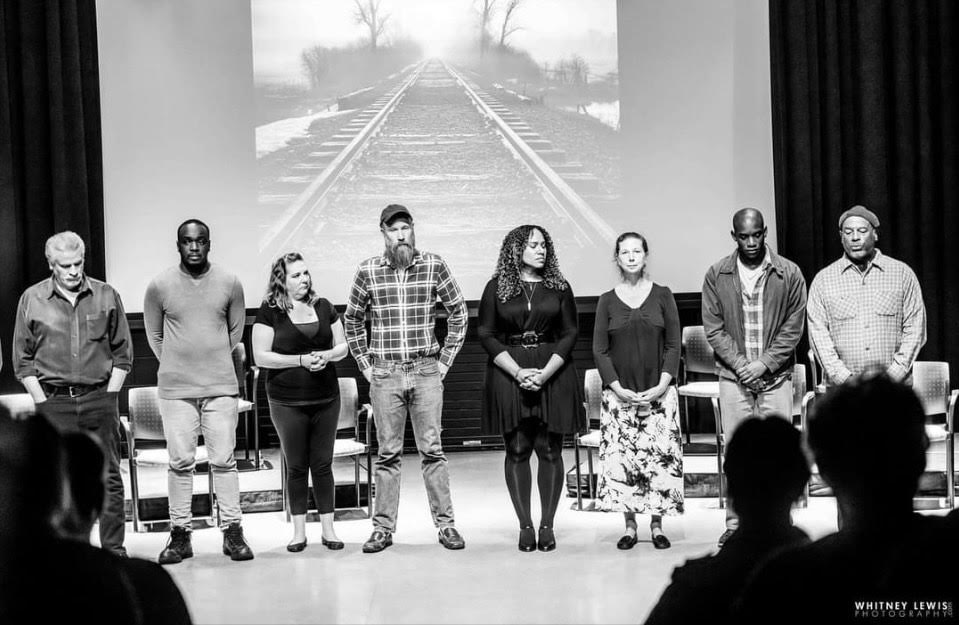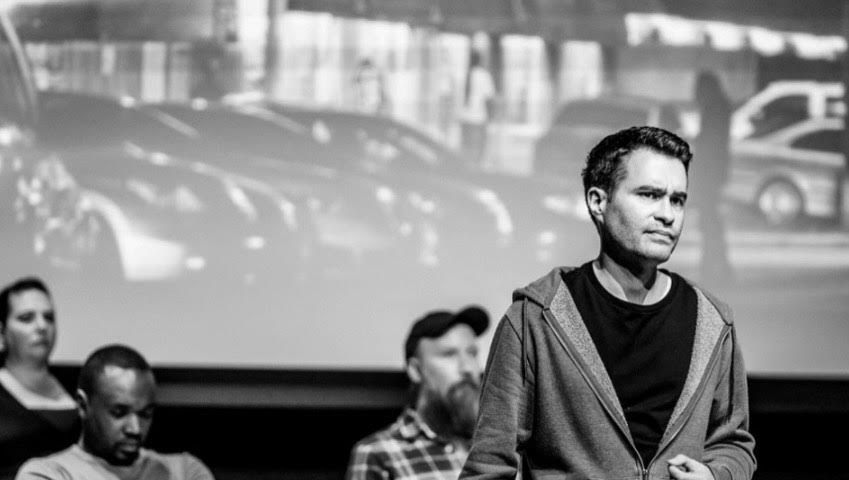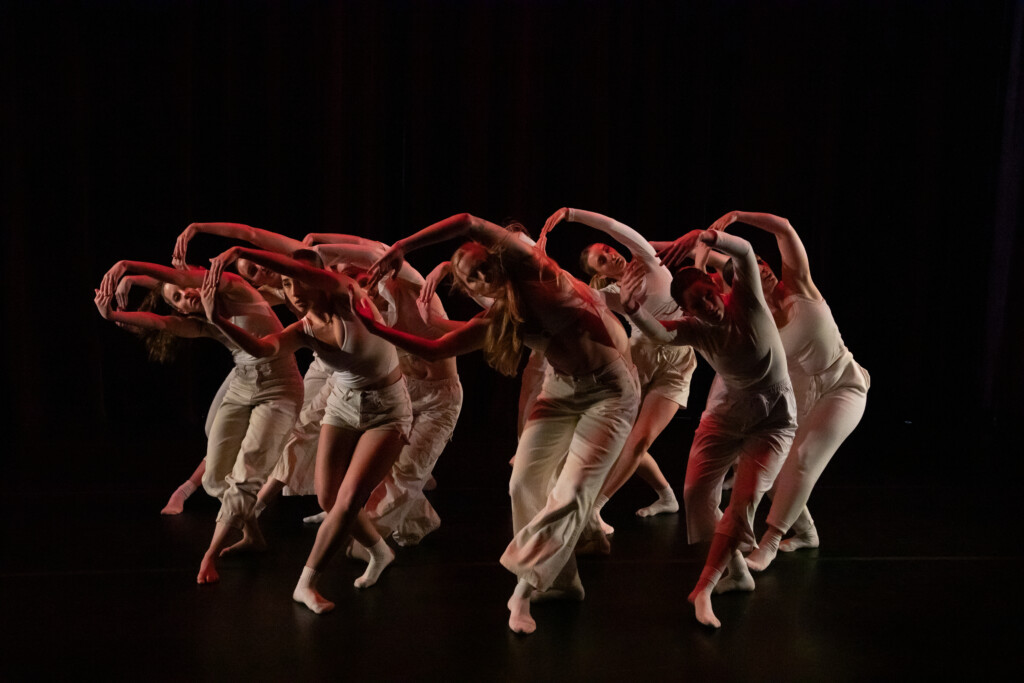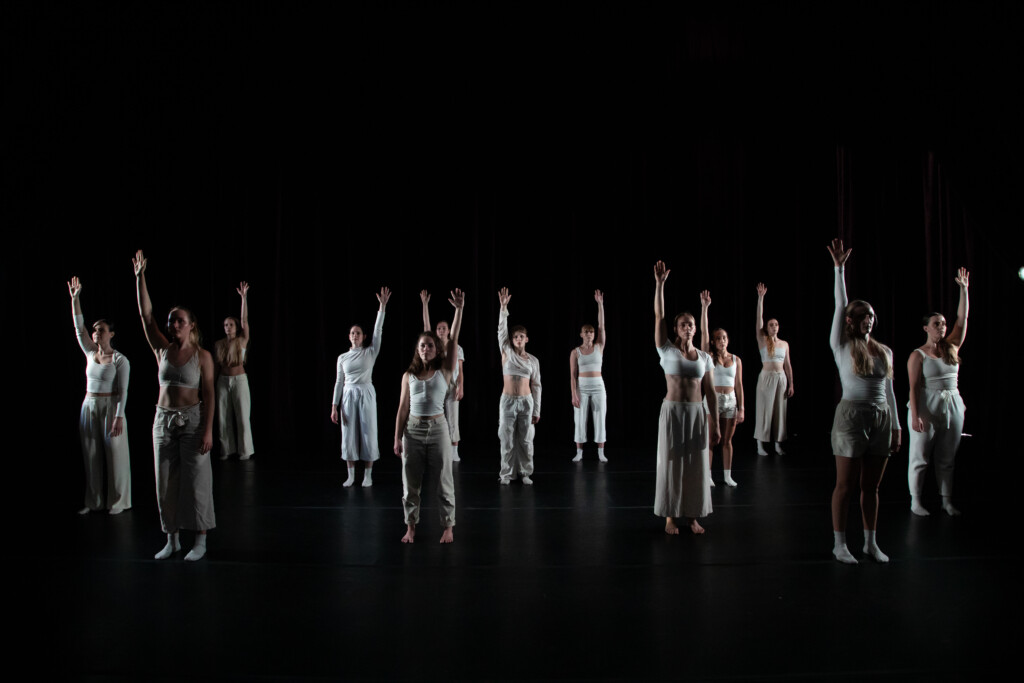The fall performing arts season in Salt Lake City has been a bountiful harvest of enterprising programming. Featured reviews include Fem Dance Company, Local Independent Theatre (LIT Co.) and NOVA Chamber Music Series.
FEM DANCE COMPANY: HEAR HER
Earlier this month, Fem Dance Company’s premiere of Hear Her, choreographed by Alicia Ross, was an enlightening, sensitively structured choreographic contemplation. Ross opened up a personal history of sexual abuse and in collaborating with the 13 dancers who performed, the work reveals a path for strengthening and nurturing an individual’s capacity to not only heal but also to rejuvenate their expressions of love, confidence and resilience.
Ross explained in a brief program note, “As a sexual assault survivor, I have found great relief in voicing my story and channeling my experiences into art.” Hear Her emerged as a clarifying choreographic tapestry, which extended beyond the work’s impetus of Ross’ direct relationship with sexual abuse and trauma. Fem Dance Company’s production evidenced that the dancers also were telling the untold stories of young women and girls who have struggled unsuccessfully to verbalize their own experiences with abuse and trauma.
Unfortunately, many survivors of sexual abuse initially blame themselves, in large part due to the stigma arising from social pressure and feelings of guilt. By concealing and internalizing their pain, survivors experience physical and emotional pain including anxiety, depression and a psychological sense of paralysis in moving forward with their lives. It can become so deeply rooted that survivors do not recognize that their pain actually is a symptom tied directly to their sexual abuse. With Hear Her, the dance movement vocabulary and syntax created by Ross and the performers represent how the conscious creative process of setting movement resets and restores the body’s ideal healthful balance in its physiological and cognitive functions.
As audience members filtered into the Regent Street Black Box Theatre, the 13 performers were on stage, casually chatting, stretching, drawing, laughing and warming up in movement. The scene segues naturally into the work, which opens with a podcast recording to set up the thematic scaffolding in Hear Her. The work subtly traces the emotional phases of an individual’s difficult journey— ranging from grief and internalized pain to comprehension and comfort and to renewal and healing.
The sense of camaraderie among the dancers is heightened by the tight space on this particular Black Box Theatre stage. Having all thirteen dancers on stage at once was handled surprisingly with enough ease to not confine or restrict the underlying emotional textures of the movement. Throughout the work, there is a conscious understated effect, which astutely defines the path to educate the audience about the straightforward significance of listening and hearing, free of stigma or prejudicial guilt.
This work exemplified a thriving sector of creative work in Utah’s dance community about the holistic benefits and therapeutic value of dance movement, particularly for those who are seeking ways to overcome their anguish and grief, while also securing their own identity. Hear Her demonstrated that these types of works enrich a distinguished and diversified culture of dance in Utah. A diverse assortment of music cued the emotional shifts in the work’s journey as well.
Performers included Annie Black, Breah Duschl, Lily Farrar, Kenzie Gannaway, Sarah Hancock, Christi Harris, Kara Komarnitsky, Jess MacDonald, Lydia Martin, Katee Norris, Natalie Petersen, Brianna Skaggs and Amy Symonds. Music and sound were drawn from the works of Keisha Lowe, Ben Frost, Emptyset, Andy Stott, Michael Wall, Robin Thicke, T.I., Pharrell Williams, Hildur Guðnadóttir, Skull Sverrisson, Guðni Franzson, Bing & Ruth and Julianna Barwick.
LOCAL INDEPENDENT THEATRE COMPANY (LIT Co.): THE EXONERATED
An intriguing bit of documentary theater, The Exonerated, a 2000 play by Jessica Blank and Erik Jensen, was given a very solid staged reading in a Local Independent Theatre (LIT Co.) production, directed by Darryl Stamp.
The production also gave Stamp and the company an opportunity to raise community awareness about ongoing efforts advocating for and assisting individuals who have been falsely accused of a capital crime and have endured years of imprisonment while efforts have moved forward to clear their names. All proceeds from the production were donated to the Utah chapter of the Innocence Project.

Blank and Jensen conducted interviews with individuals who were on death row and the resulting piece of documentary theater garnered numerous awards including the NAACP, the American Bar Association and The National Association of Criminal Defense Lawyers. It also was adapted into a Court TV film, with Danny Glover, Delroy Lindo and Susan Sarandon.
The core of the play focuses on the cases of five men and one woman (three are Black and three are White). The script is scrupulously detailed in following the individual stories from the time they were arrested to their exoneration and release. The script is comprehensive, not just in detailing the incomplete, misleading, unethical and unconstitutional errors of the entire legal process but also in the harsh experiences of life in prison. Extending the storyline are accounts of the difficulties some individuals experienced once they are exonerated.
The actors in this production conveyed the accurate definitive spirit of the material, which included Stamp, Barb Gandy, Kiirt Banks, Daniel McLeod, Dorsey Williams, Spencer Belnap, Julie Sylvestro, Yoah Kristine, Jeffrey Owen and Jack Cobabe. The Exonerated requires minimal staging, with actors seated in two rows. The stark realities and cruelties of these true stories alone propel the strength of the production.

One might believe that a documentary work such as The Exonerated is best suited for an audience of defense attorneys and political advocates for criminal justice reform. But, they already are familiar with the stories that Blank and Jensen captured. For a broader audience, while the work does not fit within the typical dramatic genre audiences expect in the theater, nevertheless, it serves a wake-up call for empathetic engagement, especially in contemplating a problematic justice system that still relies on capital punishment. On the other hand, the material is dated and, in fact, one of the individuals documented in The Exonerated (Robert Hayes] has been imprisoned for another crime and recent DNA testing indicates that Hayes may also have been responsible for the murder for which he had been acquitted. Nevertheless, the script is careful to not emphasize excessively its activist intentions as much as the two playwrights’ desire to humanize the individuals for encouraging audiences to empathize with them, given the experiences in a flawed justice system.
The LIT Co. used the production to round out the experience and bring the context of various levels of misidentification and false confessions, legal representation, and the court system up to the current moment. One performance featured a talkback which included Ann Taliaferro and Jensie Anderson representing Brown, Bradshaw, & Moffat and the J. S. Quinney School of Law at The University of Utah. Among the statistics shared included that African Americans account for 60% of those accused of murder, and 42% of those are on death row, and 34% of the executions that are carried out once all appeals are exhausted. These statistics reflect the fact that African Americans on death row are double the number of White and Latino prisoners.
The company will perform The Exonerated during the Utah Bar Association Conference in March, 2024. The production was supported by the Salt Lake City Arts Council and the National Endowment for the Arts. For more information, see the LIT Co. Facebook page.

NOVA CHAMBER MUSIC SERIES: NOV. 5 CONCERT WITH GABRIELA LENA FRANK
In every respect, NOVA Chamber Music Series’ Nov. 5 concert, which featured the Salt Lake City premiere of Gabriela Lena Frank’s new string quartet A Psalm of Disquiet, was the ideal secular variant of a Sunday spiritual service.
The concert opened with an invigorating pair of solo piano pieces — Charles-Valentin Alkan’s Barcarolle, Op. 65, no. 6 and Nikolai Medtner’s Winter Evening, performed by Sasha Kasman Laude. Alkan’s music is an alluring call to music appreciation and Kasman Laude’s impressive reading demonstrated why Alkan, France’s first Romantic Era composer for the piano, deserves more attention, even with the tremendously difficult score characterized in the work. Likewise, Kasman Laude’s arrangement of the Medtner work, which originally was one of two poems set for voice and piano, commanded equal attention. NOVA listeners have been lucky in recent years to engage with this great 20th century Russian composer, who was overshadowed by Rachmaninov during his lifetime, with the renewed visibility, thanks first to pianist Cahill Smith, who is on the Utah State University’s school of music faculty, and now, Kasman Laude, a USU colleague.
The transition to an ethereal rhapsodic setting was complete in a performance of Joaquín Turina’s Escena andaluza, Op. 7, which was completed in 1912. Comprising two sections (Twilight Serenade and At The Window), the work was performed by the Fry Street Quartet, along with violist Brant Bayless and Kasman Laude at the piano.
Turina’s scoring integrates the subtle (and sometimes exhilarating) textures of the solo viola and piano voices with the quartet so that the overall effect results in a lyrical score that would be perfect for a Spanish film about love, its visceral swings in passion and pleasure, and a gorgeous setting on a mild Andalusian evening. The balance was pitched so perfectly that a live soundtrack recording without further processing would be ready for this marvelous bit of Andalusian Impressionism to accompany a cinematic narrative.
Frank’s new string quartet composition A Psalm of Disquiet comprised the concert’s homily, so to speak, and, as Fry Street Quartet’s first violinist Robert Waters explained in a preview published at The Utah Review, it became the program’s emotional core. This was the second performance of the quartet in three days, as it received its world premiere at Utah State University, which commissioned the piece along with the Fry Street Quartet and NOVA.
Frank, whose ever-expanding music catalog is among the most frequently programmed of any American composer, has fine instincts for leveraging all spectrum points of playing effects and textures from stringed instruments. Furthermore, the composer and the quartet have established a relationship that is rooted deeply in genuine friendship as it is in mutual professional admiration.
The emotional call-and-response impacts in A Psalm of Disquiet occurred effortlessly. Frank sketched a lucid, approachable musical landscape signifying how we might process and cope with juggling and balancing moments of meditation, solace and optimism against disruptive ripples of frustration, worry and disappointment. In an interview with The Utah Review, she said, “I started to write from a sort of prayer interrupted by disquiet, with measures of anxiety mixed with unsettled feelings but yet still feeling optimistic of keeping my positive self at heart,” she explained. “It became the least pictorial but also the most psychologically rich and most personal music I have written.”
Following the earlier works on the concert which delighted, pleased and inspired the musical palate, Frank’s newest piece tempered the mood of this musical service but just enough to remind us of music’s clarifying and therapeutic possibilities, even when we might have to go deeper to find the sounds of optimism to recover from and rescue us from the more disquieting moments we encounter.
Fortifying the hopeful tone of the closing bars in Frank”s piece was Brahms’ String Quintet in F Major, Op. 88 (1882), featuring the Fry Street Quartet and Bayless, once again, on viola. Opulent textures evident everywhere, the quintet of instrumentalists capped the reading with a full-on boisterous proclamation of the final movement’s fugal statements. It was the proper jubilant send off to an exceptional spiritual service of musical emotions.
NOVA’s next concert will be Jan. 21, featuring the music of Utah composer, Igor Iachimciuc, a native of Moldavia who is on the University of Utah music faculty. Also on the slate will be Bright Sheng’s Hot Pepper (2010), scored for violin and marimba; Dai Fujikura’s Prism Spectra (2009), for viola and electronics; Jonathan Bailey Holland’s His House Is Not of This Land (2015), for violin, viola, cello, bass and clarinet and Beethoven’s String Quartet in F Major, Op. 135 (1826). For tickets and more information, see the NOVA website.





